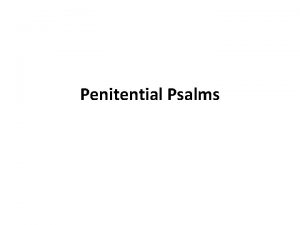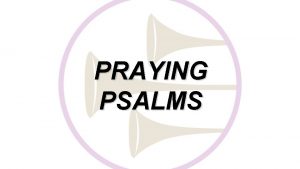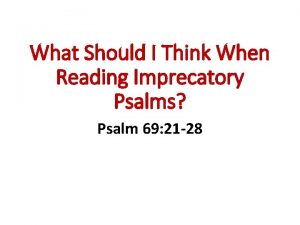The Imprecatory Psalms A Cry for Justice L







- Slides: 7

The Imprecatory Psalms A Cry for Justice

L. A. Times “Until last week, “imprecatory prayer” was not in many people’s vocabularies. But then the Rev. Wiley S. Drake, pastor of the First Southern Baptist Church of Buena Park, urged his supporters to use Psalm 109 to focus prayers directed at the “enemies of God” – including the leaders of Americans United for Separation of Church and State. Drake was urging the use of imprecatory prayer – prayers for another’s misfortune or for vengeance against God’s enemies. Now such prayer is the talk of blogs and letters to the editor. ” (Kang, B-2)

Which Psalms are Imprecatory? • • • Scott - 55, 59, 69, 79, 109 and 137 Bullock - 35, 59, 69, 79, 109 and 137 Laney - 7, 35, 58, 59, 69, 83, 109, 137 and 139 Luc - 35, 58, 69, 83, 109, and 137 Day - 7, 35, 58, 59, 69, 79, 83, 94, 109, 129, 137, 139, and 140 • Common - 69, 109 and 137 • All Psalms Included - 7, 35, 58, 59, 69, 79, 83, 94, 109, 129, 137, 139 and 140 • Possible Others: 5, 12, 40, 54 and 143

Inadequate Explanations • The Old Testament represents a lower morality than the New Testament. • This is an inspired record of uninspired and evil emotions. • The imprecations are in reality prophesies of judgment. • The Psalmist has divine insight into the matter and that justifies his declaration. • None of these positions is adequate!

Guiding Principles of Interpretation: • The Psalmists are not planning these actions; they are calling on God to carry them out. (Exodus 15: 6 -7; Deuteronomy 32: 35 -36) • These imprecations are concerned with God’s glory being vindicated. (Psalm 28: 4 -5; 64: 5; 69: 6) • The early Christians called on God to take notice of their enemies. (Acts 4: 24 -30) • A careful reading of Romans 12: 17 -13: 10 will demonstrate that God’s just punishment of the wicked frees the Christian to love his enemy.

Practical Lessons: • The Psalmists take judgment seriously. This is seen in the imprecatory Psalms. • The imprecatory Psalmists hate sin. There are two themes that we need to see in these Psalms. – Righteous indignation. – Concern for the Name of God. • The Imprecatory Psalmists live in hope of the deliverance of God.

Can we use these Psalms? • David did not take his own revenge. – Twice he refused to kill Paul (1 Samuel 24: 1 -12; 26: 5 -20) – He refused to harm Absalom. (2 Samuel 18: 5) – He refused to kill Shimei. (2 Samuel 19: 18 -23) • David did good to his enemies. (Psalm 35: 12 -14) • When David perceived his enemies to be implacable foes of God, he cried out for justice. • Paul does the very same thing! – Admittedly the language is less vivid. – However, a cry for justice always seems to be appropriate.













